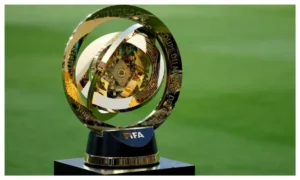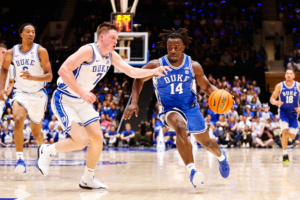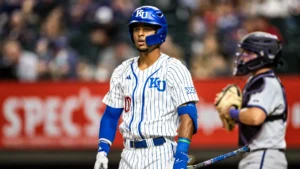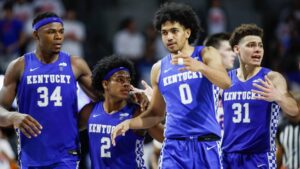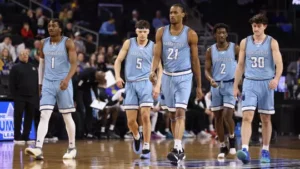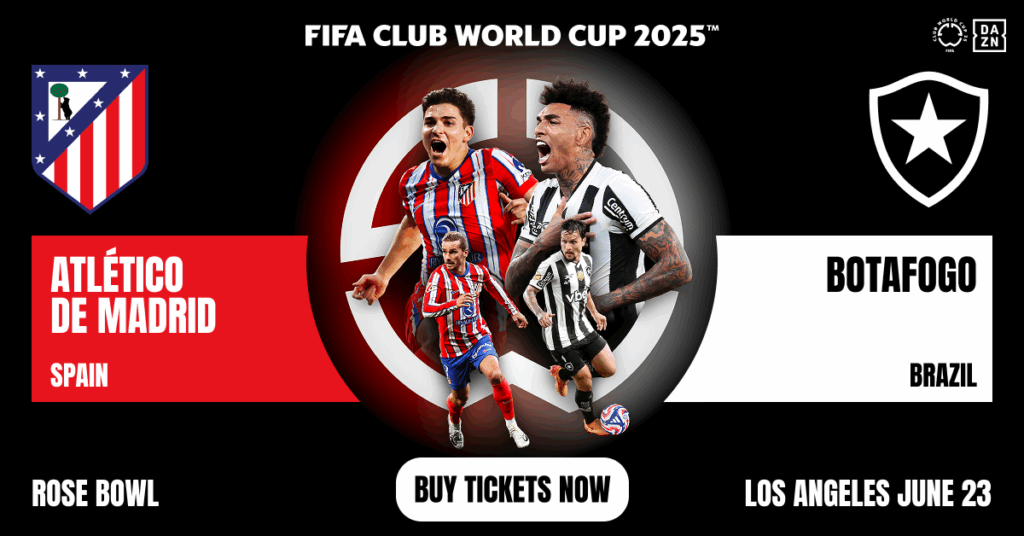
The majestic Rose Bowl in Pasadena, California, a venue more often associated with American football spectacles, is set to become the epicenter of world football drama as Atlético Madrid face off against Botafogo in a decisive Club World Cup group-stage showdown. While the clash may appear as just another fixture in a long tournament calendar, the stakes could not be higher for both teams. It is a moment where tactical discipline meets ambition, and where two footballing cultures collide under the California sun.
Atlético Madrid enter the match under pressure, carrying the weight of expectations not only as a European powerhouse but also as a club with unfinished business in international tournaments. After suffering a humiliating 4-0 loss to Paris Saint-Germain in their opening group match, Atlético managed to steady their campaign with a 3-1 win against Seattle Sounders. Yet, that defeat has left them in a precarious position, needing not only a win against Botafogo but a win by a significant margin to ensure advancement to the next round. Diego Simeone, Atlético’s battle-hardened coach, knows that only a masterclass in tactics and execution will give his team a chance to keep their tournament hopes alive.
Botafogo, meanwhile, find themselves in a rare and privileged position. Unbeaten in the group and sitting on top of the standings, the Brazilian side has been the revelation of the tournament so far. Their gritty 1-0 victory over PSG, achieved through disciplined defending and clinical finishing, sent shockwaves through the football world and affirmed that they belong on this stage. That win, coupled with a confident display against Seattle, has given them six points and momentum. A draw against Atlético would be enough to secure top spot in the group and a potentially favorable knockout round matchup.
The match presents a fascinating contrast in playing styles. Atlético Madrid, under Simeone, are famously hard-nosed and defensively astute, often relying on a compact shape, organized pressing, and quick transitions. However, in recent seasons, Simeone has adapted to a more fluid approach, allowing creative players like Antoine Griezmann more freedom in attack. In this tournament, Atlético’s tactical flexibility has been tested, especially after their dismantling at the hands of PSG. That loss exposed frailties in their defense, particularly in how they coped with pace and width. Against Seattle, Atlético’s response was impressive, especially through the midfield duo of Koke and Pablo Barrios, who brought composure and energy. Barrios, in particular, has emerged as a breakout performer, scoring twice and showcasing box-to-box dynamism that could be crucial against Botafogo’s structured midfield.
Botafogo have thrived on discipline and opportunism. Their formation, typically a 4-2-3-1 or a defensive 4-4-2, allows them to soak up pressure and hit on the counter. At the heart of this approach is Gregore, their midfield anchor, who shields the backline and initiates transitions with smart passing and positioning. Up front, Igor Jesus has led the line admirably, combining strength and movement to create problems for defenders. The Brazilian side doesn’t overcommit bodies forward; instead, they rely on precise build-ups and set-piece opportunities. Their defense has been nearly impenetrable, with center-backs blocking shots, full-backs tracking runners relentlessly, and the goalkeeper showing excellent reflexes in key moments.
For Atlético, the task is straightforward in theory but daunting in execution. They must win by at least two or three goals depending on PSG’s result against Seattle. That means taking risks, pressing high, and committing players forward—all of which could leave them vulnerable to Botafogo’s counterattacks. Simeone will likely instruct his full-backs to push higher, with Nahuel Molina and Reinildo offering width. The midfield will need to control possession and recycle the ball quickly to prevent Botafogo from settling into their defensive shape.
Antoine Griezmann remains Atlético’s creative hub. His ability to drop deep, pick up the ball, and thread passes between lines will be crucial. Expect him to combine with Ángel Correa and Memphis Depay or Álvaro Morata, depending on the lineup. Atlético must also improve their efficiency in front of goal. Missed chances have cost them dearly in previous tournaments, and against a defensively resolute team like Botafogo, opportunities will be scarce.
Botafogo’s tactical priority will be containment. Knowing Atlético need a big win, they can afford to sit deep, play compact, and force their opponents into low-percentage shots. Their full-backs will likely stay close to their central defenders, reducing space on the flanks. In midfield, the double pivot of Gregore and Marlon Freitas will aim to disrupt Atlético’s rhythm, while the wide players will track back diligently. The key for Botafogo will be timing their counterattacks. If they can win the ball in midfield and transition quickly, they might find space behind Atlético’s advancing defense.
Mental toughness will also play a significant role. For Atlético, the weight of expectation and urgency could lead to rushed decisions and frustration if they don’t score early. For Botafogo, composure and belief will be their greatest assets. If they stay calm and stick to their game plan, they can ride out Atlético’s initial waves and grow into the match.
From a predictive standpoint, the most likely outcome is a tightly contested affair. Atlético have more firepower on paper and a wealth of experience in big matches. However, their form has been inconsistent, and their vulnerability to counterattacks remains a concern. Botafogo, on the other hand, are brimming with confidence, playing with freedom, and have already shown they can neutralize elite opposition.
A 2-1 win for Atlético feels plausible, but such a result may still not be enough to see them through if PSG wins their final match. On the other hand, a 1-1 draw or even a narrow loss would be sufficient for Botafogo, making their tactical discipline and game management all the more important. Given the stakes, the intensity will be high, and we could see moments of individual brilliance, controversial decisions, or late drama define the outcome.
Regardless of who advances, this match is symbolic of the evolving landscape of global football. It’s a reminder that the gap between European and South American clubs is not as wide as some assume. Botafogo, with less budget and less global clout, have shown that structure, effort, and belief can rival even the most well-oiled machines of Europe. Atlético Madrid, with their rich pedigree and tactical pragmatism, are still searching for consistency on the international stage.
As the teams line up under the California sun and the eyes of the world turn to the Rose Bowl, one thing is certain: this is more than just a game. It is a test of resilience, a battle of ideologies, and a defining moment for both clubs. For Botafogo, it’s a chance to make history. For Atlético Madrid, it’s a fight for survival. And for football fans everywhere, it promises to be a spectacle worth remembering.
